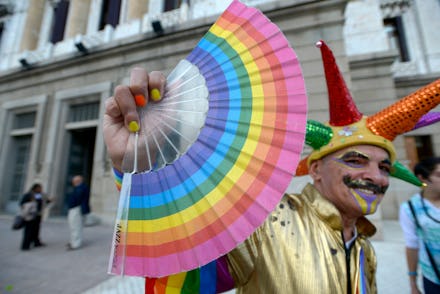The United Nations Just Acknowledged Gay Rights in a Way All Nations Should

The news: The United Nations is the latest global leader to take a strong stand in support of marriage equality. On Thursday the massive human rights organization, whose mission is "maintaining international peace and security," announced that it would start recognizing its staffers' same-sex marriages.
In his remarks about the new policy, UN Secretary-General Ban Ki-moon said, "Equality begins at home."
Previously, employees were granted personal status based upon laws in their home countries. But under the new policy, if an employee gets married where same-sex marriages are legal, his or her union will be recognized by the UN, regardless of his or her nationality.
This means UN employees and their spouses will now be able to utilize benefits such as residency visas and health care.
Image Credit: Gay Star News
This decision is the latest in a handful of equality-related victories for the UN. In 2012, the secretary-general met with representatives from UN-GLOBE, which represents LGBT UN staff. The meeting was a follow-up to an earlier town hall that addressed institutionalized discrimination against LGBT UN staff. It was also the first time a secretary-general met in person with LGBT staff to discuss such issues.
This decision could help usher in a tidal wave of change. Hopefully, countries around the world will follow the UN's lead. At the moment, only 17 out of 196 countries legally recognize same-sex marriage; a few more have regional allowances for these unions.
Image Credit: The Guardian
Distressingly, there are also 76 countries in which homosexuality is illegal. It's especially bad in some places: In Uganda, for example, the president recently signed a draconian law that punishes some homosexual acts with life in prison. During the Winter Olympics in Sochi, Russia came under harsh criticism for its "gay propaganda law" and evidence of its anti-gay feelings began to pile up. Five countries still consider homosexuality to be punishable by death.
A measure proposed by France and the Netherlands in 2008 that sought to condemn homophobic human rights violations still hasn't passed in the UN. Unlike the 2011 resolution, which went through the UN Human Rights Council, the 2008 motion was more challenging — it would need to pass the General Assembly, the main policy-making branch and the only organ of the UN in which all members have equal representation.
Image Credit: Pew Research Center
The UN's relative slowness on LGBT issues is ironic given its purpose: For an organization that aims to extend and maintain human rights across the globe, the UN has taken a surprisingly long time to recognize same-sex unions. It took until 2011 for a resolution for equal rights regardless of sexual orientation to pass.
Though this most recent step is a good one, the UN is still struggling with LGBT rights. It recently passed the Protection of the Family resolution, which narrowly defines "family" and excludes LGBT couples, single parents and grandparents, further marginalizing these groups. The election of Uganda's Sam Kutesa, an ardent supporter of Uganda's anti-gay law, to the head of the UN assembly has also sparked controversy.
Image Credit: Getty
The takeaway: The UN's latest decision is an important step toward global marriage equality and that's reason enough to celebrate. Though it still has a ways to go, many see this recent move as a promising step. Hyung Hak Nam, the president of UN-GLOBE, said in a statement, "The UN is finally starting to listen, and to act, much to its credit."